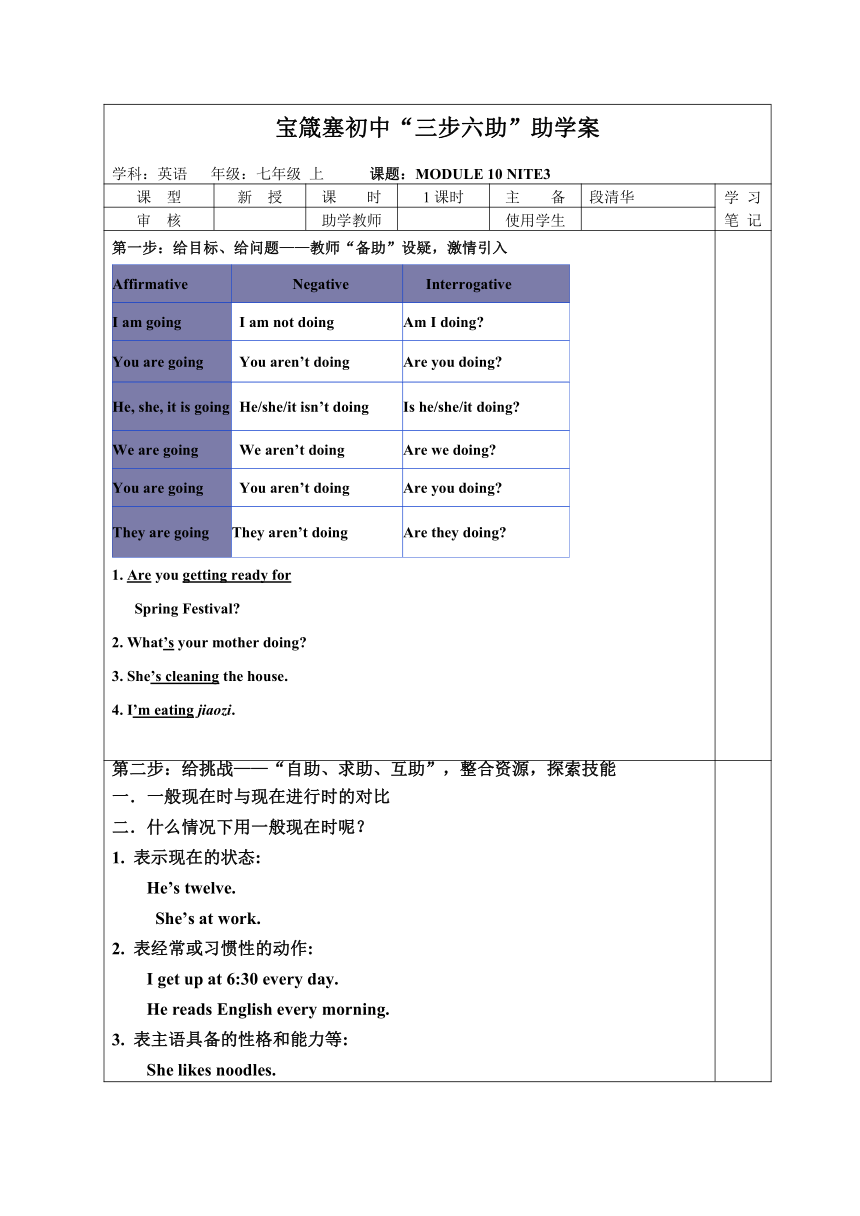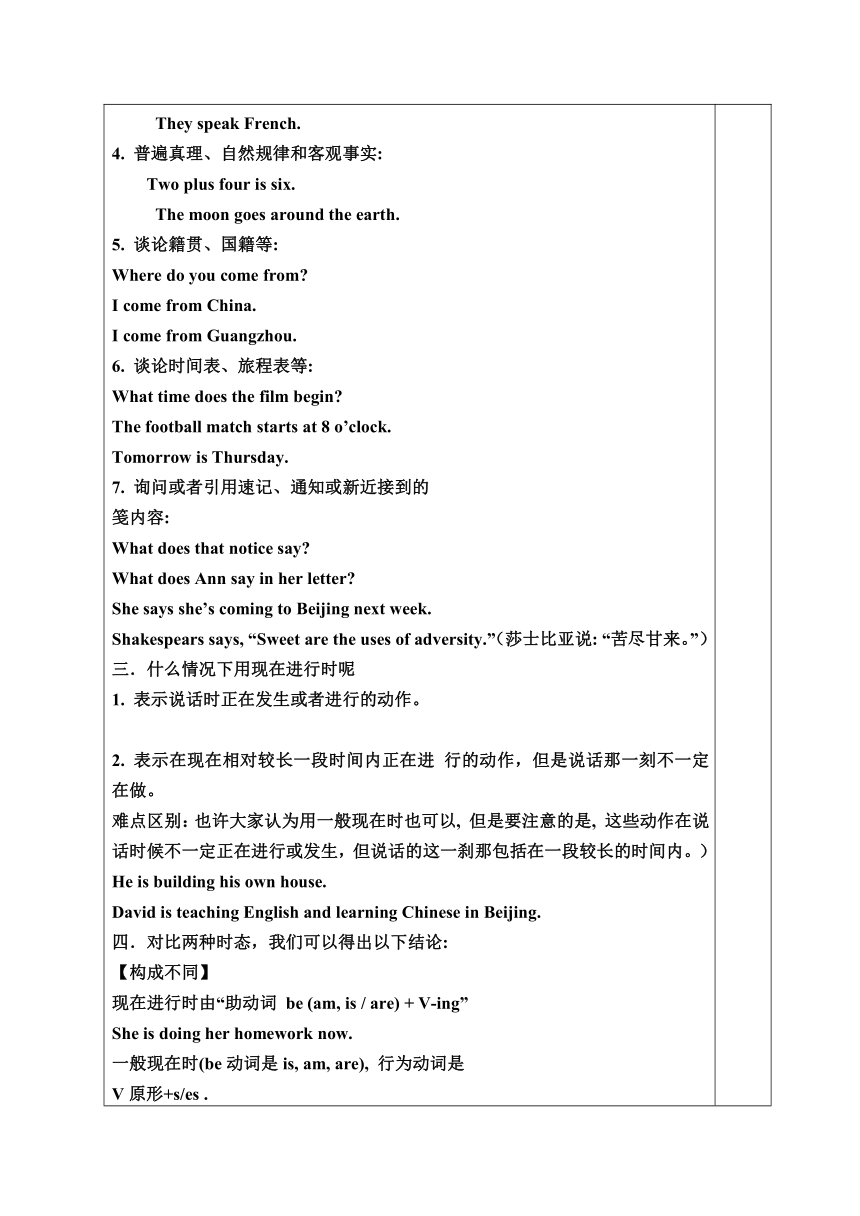外研版(2012新版)>七年级上>Module 10 Spring Festival>Unit 3 Language in use.
文档属性
| 名称 | 外研版(2012新版)>七年级上>Module 10 Spring Festival>Unit 3 Language in use. |  | |
| 格式 | zip | ||
| 文件大小 | 15.2KB | ||
| 资源类型 | 教案 | ||
| 版本资源 | 外研版 | ||
| 科目 | 英语 | ||
| 更新时间 | 2013-02-28 19:50:22 | ||
图片预览


文档简介
宝箴塞初中“三步六助”助学案
学科:英语 年级:七年级 上 课题:MODULE 10 NITE3
课 型
新 授
课 时
1课时
主 备
段清华
学 习 笔 记
审 核
助学教师
使用学生
第一步:给目标、给问题——教师“备助”设疑,激情引入
Affirmative
Negative
Interrogative
I am going
I am not doing
Am I doing?
You are going
You aren’t doing
Are you doing?
He, she, it is going
He/she/it isn’t doing
Is he/she/it doing?
We are going
We aren’t doing
Are we doing?
You are going
You aren’t doing
Are you doing?
They are going
They aren’t doing
Are they doing?
1. Are you getting ready for
Spring Festival? 2. What’s your mother doing? 3. She’s cleaning the house.
4. I’m eating jiaozi.
第二步:给挑战——“自助、求助、互助”,整合资源,探索技能
一.一般现在时与现在进行时的对比
二.什么情况下用一般现在时呢?
1. 表示现在的状态:
He’s twelve.
She’s at work.
2. 表经常或习惯性的动作:
I get up at 6:30 every day.
He reads English every morning.
3. 表主语具备的性格和能力等:
She likes noodles.
They speak French.
4. 普遍真理、自然规律和客观事实:
Two plus four is six.
The moon goes around the earth.
5. 谈论籍贯、国籍等:
Where do you come from?
I come from China.
I come from Guangzhou.
6. 谈论时间表、旅程表等:
What time does the film begin?
The football match starts at 8 o’clock.
Tomorrow is Thursday.
7. 询问或者引用速记、通知或新近接到的
笺内容:
What does that notice say?
What does Ann say in her letter?
She says she’s coming to Beijing next week.
Shakespears says, “Sweet are the uses of adversity.”(莎士比亚说: “苦尽甘来。”)
三.什么情况下用现在进行时呢
1. 表示说话时正在发生或者进行的动作。
2. 表示在现在相对较长一段时间内正在进 行的动作,但是说话那一刻不一定在做。
难点区别:也许大家认为用一般现在时也可以, 但是要注意的是, 这些动作在说话时候不一定正在进行或发生,但说话的这一刹那包括在一段较长的时间内。)
He is building his own house.
David is teaching English and learning Chinese in Beijing.
四.对比两种时态,我们可以得出以下结论:
【构成不同】
现在进行时由“助动词 be (am, is / are) + V-ing”
She is doing her homework now.
一般现在时(be动词是is, am, are), 行为动词是
V原形+s/es .
Are you a teacher?
你是教师吗?
Yes, I am. / No, I’m not.
是的,我是。/不,我不是。
He plays football every day.
现在进行时与always连用时, 往往含有赞扬厌恶责备等感彩。
He is always thinking of himself more
than others.
他总是考虑自己多于别人。
She is always changing her clothes.
她总是变化着她的衣着。
表示的是某种状态的动词, 用一般现在时。一般不说 I am knowing, 而说 I know。
常见的这类动词有: want, like, hate, know, see, hear, believe, understand, seem, think, suppose, remember, need, love, realize, mean, forget, prefer, have, belong
在there和here引起的句子中, 常用一般现在时代替现在进行时。
????Here comes the bus.
????There goes the bell.
五.【时间状语不同】
常与一般现在时连用的时间状语有: always, often, usually, sometimes, usually, never, every day/week/month/year, on Sunday(s)/ Monday(s)/in the morning/afternoon/ evening, now, today every day, every week, on Sundays, three times a week…
I write to my uncle every month.
常与现在进行时连用的时间状语有: now, at the moment。另外, 以Look, Listen等开头的祈使句常常是现在进行时态的句子。
Listen! Who is singing over there?
六.What are they doing?
七.Write questions and short answers. (Activity2)
Lingling’s mother / learning a lion dance?
—Is Lingling’s mother learning a lion
dance?
— No, she isn’t.
八.Write questions and answers about the pictures in Activity 1. (Activity3)
九.Complete the passage(Activity4)
十.Christmas and Father Christmas(Activity5)
第三步:给点评、总结——教师“补助”点评、总结,提升知识与情感。学生“再助”查漏补缺,复习巩固
Dear Linda,
Here in China it’s Spring Festival and we’re getting ready. My mother is cleaning the house and my father is helping her. Usually we have a big family dinner and we watch a special TV programme in the evening to celebrate the festival.
Tell me about a festival in your country.
Love from,
Lucy
学科:英语 年级:七年级 上 课题:MODULE 10 NITE3
课 型
新 授
课 时
1课时
主 备
段清华
学 习 笔 记
审 核
助学教师
使用学生
第一步:给目标、给问题——教师“备助”设疑,激情引入
Affirmative
Negative
Interrogative
I am going
I am not doing
Am I doing?
You are going
You aren’t doing
Are you doing?
He, she, it is going
He/she/it isn’t doing
Is he/she/it doing?
We are going
We aren’t doing
Are we doing?
You are going
You aren’t doing
Are you doing?
They are going
They aren’t doing
Are they doing?
1. Are you getting ready for
Spring Festival? 2. What’s your mother doing? 3. She’s cleaning the house.
4. I’m eating jiaozi.
第二步:给挑战——“自助、求助、互助”,整合资源,探索技能
一.一般现在时与现在进行时的对比
二.什么情况下用一般现在时呢?
1. 表示现在的状态:
He’s twelve.
She’s at work.
2. 表经常或习惯性的动作:
I get up at 6:30 every day.
He reads English every morning.
3. 表主语具备的性格和能力等:
She likes noodles.
They speak French.
4. 普遍真理、自然规律和客观事实:
Two plus four is six.
The moon goes around the earth.
5. 谈论籍贯、国籍等:
Where do you come from?
I come from China.
I come from Guangzhou.
6. 谈论时间表、旅程表等:
What time does the film begin?
The football match starts at 8 o’clock.
Tomorrow is Thursday.
7. 询问或者引用速记、通知或新近接到的
笺内容:
What does that notice say?
What does Ann say in her letter?
She says she’s coming to Beijing next week.
Shakespears says, “Sweet are the uses of adversity.”(莎士比亚说: “苦尽甘来。”)
三.什么情况下用现在进行时呢
1. 表示说话时正在发生或者进行的动作。
2. 表示在现在相对较长一段时间内正在进 行的动作,但是说话那一刻不一定在做。
难点区别:也许大家认为用一般现在时也可以, 但是要注意的是, 这些动作在说话时候不一定正在进行或发生,但说话的这一刹那包括在一段较长的时间内。)
He is building his own house.
David is teaching English and learning Chinese in Beijing.
四.对比两种时态,我们可以得出以下结论:
【构成不同】
现在进行时由“助动词 be (am, is / are) + V-ing”
She is doing her homework now.
一般现在时(be动词是is, am, are), 行为动词是
V原形+s/es .
Are you a teacher?
你是教师吗?
Yes, I am. / No, I’m not.
是的,我是。/不,我不是。
He plays football every day.
现在进行时与always连用时, 往往含有赞扬厌恶责备等感彩。
He is always thinking of himself more
than others.
他总是考虑自己多于别人。
She is always changing her clothes.
她总是变化着她的衣着。
表示的是某种状态的动词, 用一般现在时。一般不说 I am knowing, 而说 I know。
常见的这类动词有: want, like, hate, know, see, hear, believe, understand, seem, think, suppose, remember, need, love, realize, mean, forget, prefer, have, belong
在there和here引起的句子中, 常用一般现在时代替现在进行时。
????Here comes the bus.
????There goes the bell.
五.【时间状语不同】
常与一般现在时连用的时间状语有: always, often, usually, sometimes, usually, never, every day/week/month/year, on Sunday(s)/ Monday(s)/in the morning/afternoon/ evening, now, today every day, every week, on Sundays, three times a week…
I write to my uncle every month.
常与现在进行时连用的时间状语有: now, at the moment。另外, 以Look, Listen等开头的祈使句常常是现在进行时态的句子。
Listen! Who is singing over there?
六.What are they doing?
七.Write questions and short answers. (Activity2)
Lingling’s mother / learning a lion dance?
—Is Lingling’s mother learning a lion
dance?
— No, she isn’t.
八.Write questions and answers about the pictures in Activity 1. (Activity3)
九.Complete the passage(Activity4)
十.Christmas and Father Christmas(Activity5)
第三步:给点评、总结——教师“补助”点评、总结,提升知识与情感。学生“再助”查漏补缺,复习巩固
Dear Linda,
Here in China it’s Spring Festival and we’re getting ready. My mother is cleaning the house and my father is helping her. Usually we have a big family dinner and we watch a special TV programme in the evening to celebrate the festival.
Tell me about a festival in your country.
Love from,
Lucy
同课章节目录
- Starte
- Module 1 My teacher and my friends
- Module 2 My English lesson
- Module 3 My English book
- Module 4 My everyday life
- Module 1 My classmates
- Unit 1 Nice to meet you.
- Unit 2 I'm Wang Lingling and I'm thirteen years ol
- Unit 3 Language in use.
- Module 2 My family
- Unit 1 Is this your mum?
- Unit 2 These are my parents.
- Unit 3 Language in use.
- Module 3 My school
- Unit 1 There are thirty students in my class.
- Unit 2 The library is on the left of the playgroun
- Unit 3 Language in use.
- Module 4 Healthy food
- Unit 1 We've got lots of apples.
- Unit 2 Is your food and drink healthy?
- Unit 3 Language in use.
- Module 5 My school day
- Unit 1 I love history.
- Unit 2 We start work at nine o'clock.
- Unit 3 Language in use.
- Revision module A
- Module 6 A trip to the zoo
- Unit 1 Does it eat meat?
- Unit 2 The tiger lives in Asia.
- Unit 3 Language in use.
- Module 7 Computers
- Unit 1 How do I write my homework on the computer?
- Unit 2 When do you use a computer?
- Unit 3 Language in use.
- Module 8 Choosing presents
- Unit 1 I always like birthday parties.
- Unit 2 She often goes to concerts.
- Unit 3 Language in use.
- Module 9 People and places
- Unit 1 We're enjoying the school trip a lot.
- Unit 2 They're waiting for buses or trains.
- Unit 3 Language in use.
- Module 10 Spring Festival
- Unit 1 Are you getting ready for Spring Festival?
- Unit 2 My mother's cleaning our houses and sweepin
- Unit 3 Language in use.
- Revision module B
